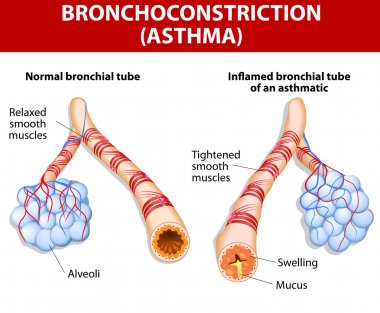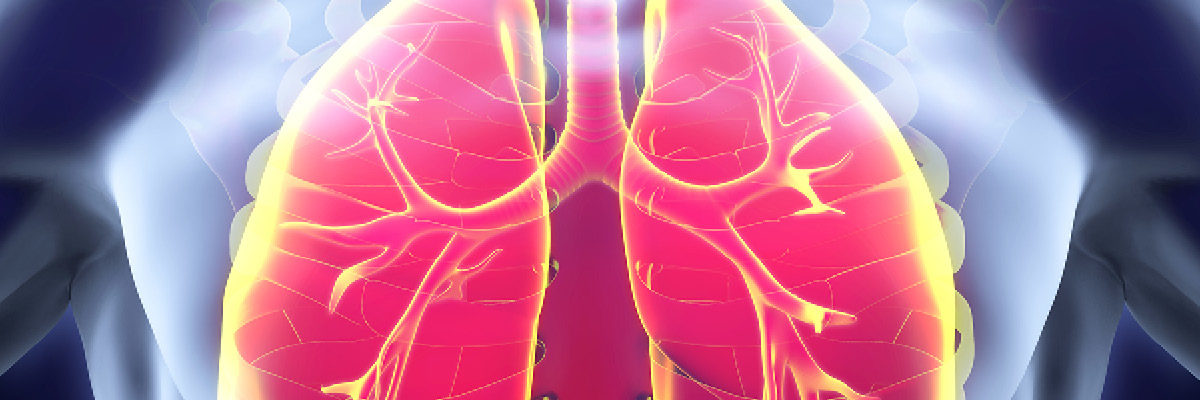Asthma is a heterogeneous inflammatory disease that affects the lungs’ airways. It is usually characterized by an influx of inflammatory cells followed by airway obstruction and hypersensitivity.

Excessive secretion of mucus. The classic form of asthma is mediated by T helper cell type 2 (Th2) cells and is characterized by eosinophil inflammation and immunoglobulin (Ig) E. In addition, PM (Particulate Matter) has been shown to activate a Th17-mediated immune response with overproduction of the cytokine IL-17a. It further promotes Th2-mediated inflammation of eosinophils and the influx of neutrophils into the airways, exacerbating asthma symptoms.
Asthma can be triggered by several reasons such as environment, inheritance, and lifestyle. Hence, in this blog, I would like to focus on the cause of pollution by sharing the study “The Role of Fucoidans Isolated from the Sporophylls of Undaria pinnatifida against Particulate-Matter-Induced Allergic Airway Inflammation: Evidence of the Attenuation of Oxidative Stress and Inflammatory Responses,” by Hyo Jin Kim et al.
Surrounding Particulate Matter (PM) is an essential environmental pollutant that promotes the onset and worsening of respiratory diseases such as asthma through inflammation of the airways and hypersecretion of mucus.
Particulate Matter (PM) is a major air pollutant that has received considerable attention due to rapid urbanization and industrialization in the last few years. Additionally, PM (PM2.5) with a diameter of less than 2.5 µm can easily float in the air and penetrate deep airways when inhaled. Polycyclic aromatic hydrocarbons and heavy metals in PM can cause the production and inflammation of reactive oxygen species (ROS) in the airways, further exacerbating asthma symptoms and driving the development of asthma.
On a positive note, it is already known that fucoidan is a sulfated polysaccharide extracted from brown algae. It has been extensively studied, researched, and understood to possess various biological activities such as anti-inflammation, anti-allergic, anti-cancer, and anti-thrombotic effects.
Hence, the study was done to clarify the effect of fucoidan isolated from sporophyll of wakame seaweed on asthma symptoms such as inflammatory reaction and mucus secretion using a Balb/c mouse model.
Balb/c mice (OVA, ten µg) intraperitoneally sensitized with ovalbumin were dissolved in 200 µL saline and 2 mg Al (OH) 3. They were then exposed to PM (5 mg / m3) for seven consecutive days. In parallel, along with PM exposure, they orally administrated fucoidan (100, 400 mg / Kg) or prednisone (5 mg / Kg), an anti-inflammatory drug. Oral administration of fucoidan was found to reduce PM-induced lipid peroxidation and infiltration of inflammatory cells significantly. (See Fig.1)
They also noticed that oral administration of fucoidan significantly reduced PM-induced lipid peroxidation and infiltration of inflammatory cells such as F4 / 80 + macrophages, Gr-1 + granulocytes, and CD4 + T lymphocytes. Fucoidan also decreases levels of PM-deteriorating IL-4, a primitive cytokine released in Th2-mediated eosinophilic asthma. (See Fig. 2)
PM-exposed mice further suppressed mast cell activation, degranulation, and IgE synthesis. Interestingly, fucoidan diminished PM-exacerbated mucus hypersecretion and goblet cell hyperplasia. Therefore, the results suggest that fucoidan effectively alleviates the symptoms of allergic asthma with aggravated PM by reducing the inflammatory response and hypersecretion of the airways.


